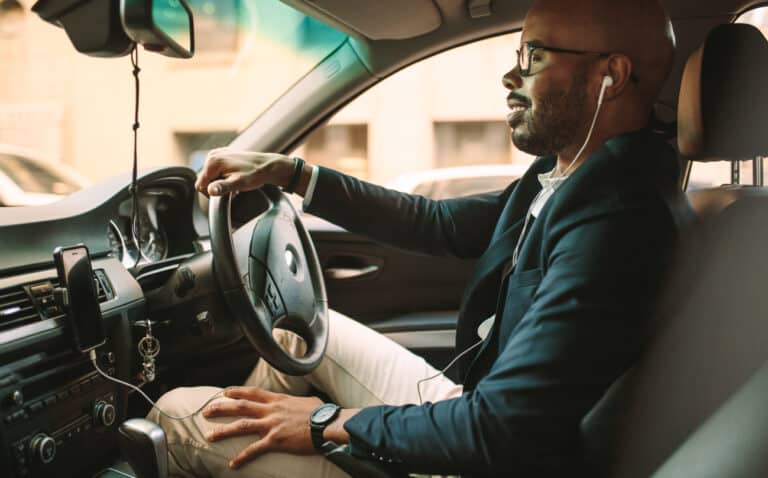Driving With Headphones: Risks of Distracted Driving
Category: Car Accidents
Article by Heath A. Tuley

Paying attention while driving includes more than just keeping your eyes on the road. Listening to music, catching up on a podcast, or calling friends in the car all require you to divert your focus. Driving while distracted can lead to many different types of car crashes.
Beyond noise being a distraction, it can also sometimes prevent you from being able to hear other necessary sounds. Wearing headphones while driving can be very dangerous for both you and other drivers.
Driving With Headphones in Indiana
Headphones Can Lead to Negligence
Because headphones can be a factor in car accidents, you should understand how negligence and driving laws apply if a car accident occurs.
Indiana is an at-fault state that typically follows a comparative fault rule. If a crash could’ve been avoided had the driver not been wearing headphones, an insurance company may point to that when determining fault.
Indiana’s Distracted Driving Laws
In 2011, the state of Indiana passed a law banning texting and driving. However, there were no specific rules against holding mobile devices for other purposes. This law was difficult to enforce and did not significantly reduce the number of distracted driving incidents. A new law aims to more adequately prevent drivers from getting distracted while controlling a vehicle.
Put in effect in 2020, the Indiana Hands-Free Driving Law prohibits drivers from holding mobile devices in their hands while operating their vehicles. The goal is to encourage the use of hands-free features for music, communication, and navigation. Even though these tasks can still be distracting, this legislation strives to minimize the amount of effort which must be dedicated to them.
Hands-Free Driving Law Penalties
If a law enforcement officer catches you with a phone or other mobile device in-hand while driving, you may be subject to a fine and a Class C infraction. Officers also began assessing license points in 2021.
If you are in an emergency situation, you may be justified in using your device. However, the main goal of this law is safety, so try to remember it was made in your best interest.
If you get into an accident as a result of distracted driving—messing with the radio, texting, or using another handheld mobile device—you will likely be held accountable by the victim for compensation.
Why Driving While Wearing Headphones or Earphones Is Dangerous
While the Hands-Free Driving Law aims to prevent distractions, it does not fully prevent accidents. According to the Insurance Institute for Highway Safety (IIHS), even though cell phone use has not increased in recent years, crashes have. Drivers are still more distracted than ever.
Avoiding distractions and focusing all your attention on the road at a personal level will help keep you safer than any law can. You have no control over the actions of others, and the ability to respond to unforeseen situations is key to defensive driving.
When you wear headphones or earbuds while driving, you forfeit your hearing. This means you might not be able to hear horns, incoming sirens, motorcycles, and other noises indicative of a potentially dangerous event.
This threat has become increasingly dangerous with the newfound popularity of noise-canceling headphones. These devices are specifically designed to block external sounds.
Truck Accidents From Driving With Headphones
Semi-truck drivers have very long shifts and drive loud vehicles. Depending on the rules of their company, they may be more likely to wear headphones.
With larger blindspots and less maneuverability, distracted truck drivers pose a serious threat to other drivers and passengers. Remain vigilant and give other vehicle operators sufficient space, especially when you are on exceptionally dangerous trucking roads,
How Can Tuley Law Office Car Accident Lawyers Help?
Our Evansville auto accident lawyers offer a variety of services to the victims of car accidents in Indiana. From beginning to end, we will help you through the process so you can focus your energy on recovering.
Proving Negligence
We will recreate the accident and investigate all leads to build the best possible car accident lawsuit for the circumstances. If the other driver did not respond to a car horn or emergency vehicle siren because they had headphones in/on, we will prove it.
Insurance companies might cite other factors as the main issue, but we will ensure that case information is focused on the true cause—the defendant’s negligence.
Disputing Insurance Companies
An insurance company is a business and thus does not want to lose money. To avoid paying damages, the insurer may attempt to blame you. If that does not work, they may continue attacking you to give you a percentage of the fault, which would lower the damages they are required to pay.
Our attorneys know the strategies insurance companies might use and are prepared to combat their tactics. We will protect you from intimidation tactics and get you the compensation you deserve.
Representation in Court
If the insurance company refuses to settle or attempts to escape responsibility, our lawyers will provide legal representation in courtroom proceedings.
A case that goes to court does not proceed the same way as a settlement discussion. Having experienced legal counsel on your side will greatly increase your chances of recovering benefits from the negligent party.
Hire a Car Accident Attorney in Evansville, Indiana
Understanding your rights in an Indiana car accident could mean the difference between compensation and financial hardship. If you are injured as a result of another driver’s negligence, you have two years to file a car accident lawsuit as per the Indiana statute of limitations. Do not hesitate to pursue the damages you are entitled to.
If you suspect that the other driver was distracted or not paying full attention to the road, contact one of our lawyers today. You may be assigned more fault than you deserve if you are wearing headphones while driving—even if the other driver made the mistake that caused the accident.
Have questions about your case?
Contact us